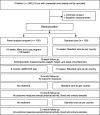A randomized controlled trial for overweight and obesity in preschoolers: the More and Less Europe study - an intervention within the STOP project
- PMID: 31307412
- PMCID: PMC6631737
- DOI: 10.1186/s12889-019-7161-y
A randomized controlled trial for overweight and obesity in preschoolers: the More and Less Europe study - an intervention within the STOP project
Abstract
Background: Childhood overweight and obesity is a serious public health issue with an increase being observed in preschool-aged children. Treating childhood obesity is difficult and few countries use standardized treatments. Therefore, there is a need to find effective approaches that are feasible for both health care providers and families. Thus, the overall aim of this study is to assess the acceptance and effectiveness of a parent support program (the More and Less, ML) for the management of overweight and obesity followed by a mobile health (mHealth) program (the MINISTOP application) in a socially diverse population of families.
Methods/design: A two-arm, parallel design randomized controlled trial in 300 2-to 6-year-old children with overweight and obesity from Romania, Spain and Sweden (n = 100 from each). Following baseline assessments children are randomized into the intervention or control group in a 1:1 ratio. The intervention, the ML program, consists of 10-weekly group sessions which focus on evidence-based parenting practices, followed by the previously validated MINISTOP application for 6-months to support healthy eating and physical activity behaviors. The primary outcome is change in body mass index (BMI) z-score after 9-months and secondary outcomes include: waist circumference, eating behavior (Child Eating Behavior Questionnaire), parenting behavior (Comprehensive Feeding Practices Questionnaire), physical activity (ActiGraph wGT3x-BT), dietary patterns (based on metabolic markers from urine and 24 h dietary recalls), epigenetic and gut hormones (fasting blood samples), and the overall acceptance of the overweight and obesity management in young children (semi-structured interviews). Outcomes are measured at baseline and after: 10-weeks (only BMI z-score, waist circumference), 9-months (all outcomes), 15- and 21-months (all outcomes except physical activity, dietary patterns, epigenetics and gut hormones) post-baseline.
Discussion: This study will evaluate a parent support program for weight management in young children in three European countries. To boost the effect of the ML program the families will be supported by an app for 6-months. If the program is found to be effective, it has the potential to be implemented into routine care to reduce overweight and obesity in young children and the app could prove to be a viable option for sustained effects of the care provided.
Trial registration: ClinicalTrials.gov NCT03800823; 11 Jan 2019.
Keywords: Children; Family; Obesity; Overweight; Stop; Treatment; mHealth.
Conflict of interest statement
The authors declare that they have no competing interests.
Figures
References
-
- World Health Organization. The Commision on ending childhood obesity. https://www.who.int/end-childhood-obesity/publications/echo-plan-executi.... Accessed 20 Feb 2019.
-
- World Health Organization. Facts and figures on childhood obesity. http://www.who.int/end-childhood-obesity/facts/en/. Accessed 20 Feb 2019.
-
- Geserick M, Vogel M, Gausche R, Lipek T, Spielau U, Keller E, et al. Acceleration of BMI in early childhood and risk of sustained obesity. N Engl J Med. 2018;379(14):1303–1312. - PubMed


